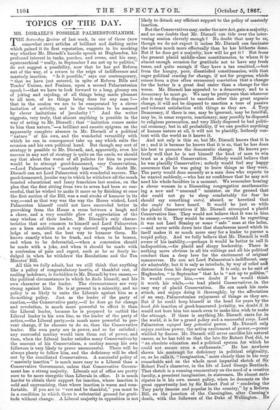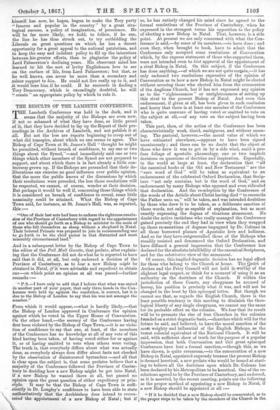TOPICS OF THE DAY.
MR. DISRAELI'S POSSIBLE PALME1ISTONIAN1SM. THE Saturday lIeciew of last week, in one of those (now somewhat rare) articles of brilliant and dashing satire which gained it its first reputation, suggests in its mocking way whether Mr. Disraeli's bucolic speech at Hughenden, his profound interest in tanks, porches, and ovens, and his easy, squirearchical "really, in September I am not up to politics," do not suggest a possibility, now that he has got Reform out of the way, of a return to the reign of indifference and masterly inaction. "Is it possible," says our contemporary, "that we have just entered, in spite of Reform Bills and Trades' Unions, and Fenians, upon a second Palmerstonian epoch ?—that we have to look forward to a long, gloomy era of joking and cajoling, of all things being .made pleasant to all men, of no things being done for any man ?— that in the session we are to be exasperated by a clever imitation of activity, and in the vacation to be amused by clever imitations of jocularity ? " And the writer suggests, very truly, that almost anything is possible in the way of acting to Mr. Disraeli ; that "imitation comes easier to him than nature,"—a brilliant and caustic epigram on the apparently complete absence in Mr. Disraeli of a political " nature " of his own, and the wonderful versatility with which he can in consequence take up any which suits the occasion and his own political hand. But though any sort of strategy is possible to Mr. Disraeli, and, apparently, even his success in any sort of strategy is quite on the cards, we should say that about the worst of all policies for him to pursue would be to attempt good-humoured, easy Conservatism, —Lord Palmerston's "masterly inaction." No doubt Mr. Disraeli can act Lord Palmerston with wonderful success. The good-humoured, jocular way in which he withdrew all the much boasted educational and fancy franchises last session, on the plea that the first sitting from two to seven had been so suc- cessful, that he wished to make it more so by finishing at once the first section of the Bill, was a real stroke of humour in its way,—and as that way was the way the House wished, Lord Palmerston himself could not have succeeded better in provoking from the House a cross between a laugh and a cheer, and a very sensible glow of appreciation of the easy wisdom of their leader. Mr. Disraeli's only charac- teristics that are common to himself and Lord Palmerston are a keen ambition and a very shrewd superficial know- ledge of men, and the best way to humour them. He knows exactly when to be frank, and when to be brazen, and when to be deferential,—when a concession should be made with a joke, and when it should be made with a confession of pain and regret, such as he so freely in- dulged in when he withdrew the Resolutions and the Ten Minutes' Bill.
All this we fully admit, but we still think that anything like a policy of congratulatory inertia, of thankful rest, of smiling indolence, is forbidden to Mr. Disraeli by two causes,— the political circumstances in which he finds himself, and his own character as the leader. The circumstances are very strong against him. He is at present in a minority, and no policy is so likely to unite the Liberals against him as a do-nothing policy. Just as the leader of the party of caution,—the Conservative party,—if he does go for change and revolution, is much more powerful to effect it than the Liberal leader, because he is prepared to outbid the Liberal leader in his own line, so the leader of the party of action,—the Liberal party,—is much more powerful to pre- vent change, if he chooses to do so, than the Conservative leader. His own party are in power, and so far satisfied ; any successful mutiny would turn them out of power, and then, when the Liberal leader satisfies many Conservatives by the amount of his Conservatism, a mutiny among his own followers is very likely to prove unsuccessful. There will be always plenty to follow him, and the deficiency will be eked out by the conciliated Conservatives. A successful policy of "masterly inaction" is much more easy to a Liberal than a Conservative Government, unless that Conservative Govern- ment has a strong majority. Liberals out of office are pretty sure to be more energetic than Liberals in office. It is much harder to obtain their support for inaction, where inaction is cold and unpromising, than where inaction is warm and com- fortable. If you are to "rest and be thankful," you must be in a condition in which there is substantial ground for grati- tude without change. A Liberal majority in opposition is not likely to detach any efficient support to the policy of masterly inaction.
But the Conservatives may, under the newAct, gain a majority; and no one doubts that Mr. Disraeli can tide over the inter- vening session cleverly enough ? No doubt that may be so,. though we do not expect it unless Mr. Disraeli can fascinate the nation 'much more effectually than he has hitherto done But if he does get a majority, how will he get it Not fronr the present placid middle-class constituencies, to whom it almost enough occasion for gratitude not to have any fresh taxes, and quite enough if they have a tax remitted,—but from the hungry, poor, dissatisfied constituencies, with that eager political craving for change, if not for progress, which comes from a (too often erroneous) conviction that a change' for the better is a great deal easier than a change for the worse. Mr. Disraeli has appealed to a democracy, and to a democracy he must go. We may be pretty sure that whatever else it may be disposed to sanction after this great organic- change, it will not be disposed to sanction a tone of passive and tolerant satisfaction with things as they are. A Tory, Democracy, if there is one, may be ignorant, may be fanciful, may be, in some respects, reactionary, may' ay possibly be disposed to religious persecution, and very likely disposed to bad politi- cal economy, but in all probability, if we can predict anything of human nature at all, it will not be placidly, listlessly con-- tent with the world as it knows it.
And not only is this so, but Mr. Disraeli knows that it is. so ; and it is because he knows that it is so, that he has done. his best to promote the democratic change. He knows per- fectly well that he is not himself the kind of man to win trust as a placid Conservative. Nobody would believe that he was placidly Conservative ; nobody would feel any happy assurance that he was going -to leave things as they were. . The party would doze uneasily as a man does who expects to be wanted suddenly,—who has no confidence that he may not need his whole faculties in a moment. We remember hearing- a clever woman in a Dissenting congregation anathematiz- ing a new and " unsound " minister, on the ground that she could not go to sleep comfortably for fear he should say something outré, absurd, or heretical that. she ought to have heard. It would be just so with, the placid Conservatives if Mr. Disraeli attempted a placid Conservative line. They would not believe that it was in him. to stick to it. They would be uneasy,—would be regretting it was not Lord Stanley or some " safe " man at the helm, —and never settle down into that slumberous mood which in itself makes it so much more easy for a leader to pursue a. torpid policy. And we fully believe that Mr. Disraeli is well aware of his inability,—perhaps it would be better to call it indisposition,—for placid and sleepy leadership. There is nothing more obvious in all his writings and all his political conduct than a deep love for the excitement of origins,/ manceuvres. Be can act Lord Palmerston's indifferent, easy air admirably, but it is only as interlude, by way of relief an distraction from his deeper schemes. It is only, as he said at Hughenden, "in September" that he is "not up 'to politics." It would ennuyer him,—we doubt if he would think it worth his while,—to lead placid Conservatives in the easy way of placid Conservatism. He can mask his main attack, and enjoys doing it thoroughly, by the affectation of an easy, Palmerstonian enjoyment of things as they are. But if he could keep himself at the head for years by the bond fide inaction of good-humoured joviality, we doubt if it would not bore him too much even to make him wish to make the attempt. If there is anything Mr. Disraeli cares for in the world, it is for a grand policy and a successful coup. Lord Palmerston enjoyed lazy potential power. Mr. Disraeli only enjoys restless power, the active excitement of power,—power wielded by finesse. Mr. Disraeli will never sacrifice his natural career, as he has told us that the late Sir Robert Peel did, to "an obsolete education and a political system for which he could not secure even a euthanasia." He has nowhere shown his contempt for deficiency in political originality, or, as he calls it, "imagination," more clearly than in his very remarkable and on the whole most impartial sketch of Sir Robert Peel's character, in the life of Lord George Bentinck. That sketch is a running commentary on the need of a creative faculty, a prescient imagination, in statesmen. He almost anti- cipates in it his own recent policy, when he descants on the great opportunity lost by Sir Robert Peel of "rendering the Tory party famous and popular in the country," by a Reform Bill, on the junction of the Canningites, after Canning s death, with the followers of the Duke of Wellington. He himself has now, he hopes, begun to make the Tory party 4‘ famous and popular in the country" by a great stra- tegical success, a policy of imagination, of prescience. He -will be far more likely, we hold, to follow, if he can, the line he has thus struck out, to try outbidding the Liberals on great questions on which he has a decent opportunity for a great appeal to the national patriotism, and to keep the easy and indolent policy to fill up the interstices between his greater efforts, than to plagiarize the policy of Lord Palmerston's declining years. His observant mind has learned •to hit the sort of levity Englishmen love to see on the surface of life, from Lord Palmerston; but that, as he well knows, can never be more than a secondary and .minor support to him. He could not live really up to it, and it would bore him if he could. If he succeeds in finding a Tory Democracy, which is exceedingly doubtful, he will g‘
create" an appropriate policy by which to rule it.































 Previous page
Previous page